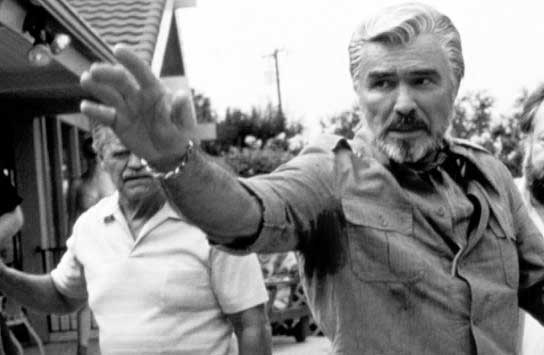
By Sandy Grossman
Burt Reynolds was an Actor, capital A. He had this Old Hollywood persona—square jaw and all. He took respectable roles in respectable movies. They weren’t really prestige dramas, sure. He is best known for playing a race car drivin’ cowboy with a car full of Coors, but that didn’t hurt his reputation. His movies are classical, steeped in action cliches and traditions.
“Boogie Nights” is none of that. It’s profane, intense, sad and more than a little strange: not the kind of thing that would fit in the proverbial Old Hollywood. And yet, without Burt Reynolds, that movie would not be the wonder that it is. As porn producer Jack Horner, he is hopeful, idealistic, and deeply melancholic. Beyond crafting a compelling character, he provides something vital to the audience: perspective.
The film opens with Jack at the top of the late 70s LA porn scene. He finds talent, directs films and runs the company. As Horner leads Eddie Adams (Mark Wahlberg) to pornographic stardom, we see he is not just a leader, but a sort of surrogate father as well. His actors and crew-members all look to him for acceptance and trust. While Eddie is the protagonist of the movie, it is Horner’s eyes through which we see the world, his perspective we are asked to adopt. His cohort of actors are drug addled, occasionally violent, somewhat selfish people. As mothers, fathers, sons, or daughters, they are all found wanting, yet they are welcomed into Jack’s family without question, motivating the audience to do the same. Reynolds embodies the character in a way that is unique to him, conveying an inner sadness that goes beyond his lines.
Horner is not without his share of troubles. He wants so badly to be an artist but finds himself thwarted repeatedly. He strives for respect, from his surrogate family and the world at large, but gets little. Ironically, Burt Reynolds seems to be the man Jack Horner wants to be: a respectable man in a respectable world. Whether it was because of or in spite of the actor’s relationship with the character, Reynolds famously hated “Boogie Nights.” He fought with director Paul Thomas Anderson, once almost coming to blows, and never really wanted the role in the first place. In a 2017 appearance on Conan, Reynolds said the movie “made [him] very uncomfortable,” which makes sense. It’s not exactly “respectable.” But he took the job anyway and delivered a performance that simultaneously anchors the film and deepens the character; a performance as true and right and dramatic as any I’ve seen.
And that is why, on this sad occasion, I would like to thank you Mr. Reynolds. You may have refused to see “Boogie Nights,” but it is because of you that I’ve seen it half a dozen times.
Subscribe to the Mossy Log Newsletter
Stay up to date with the goings-on at Lewis & Clark! Get the top stories or your favorite section delivered to your inbox whenever we release a new issue.

Leave a Reply